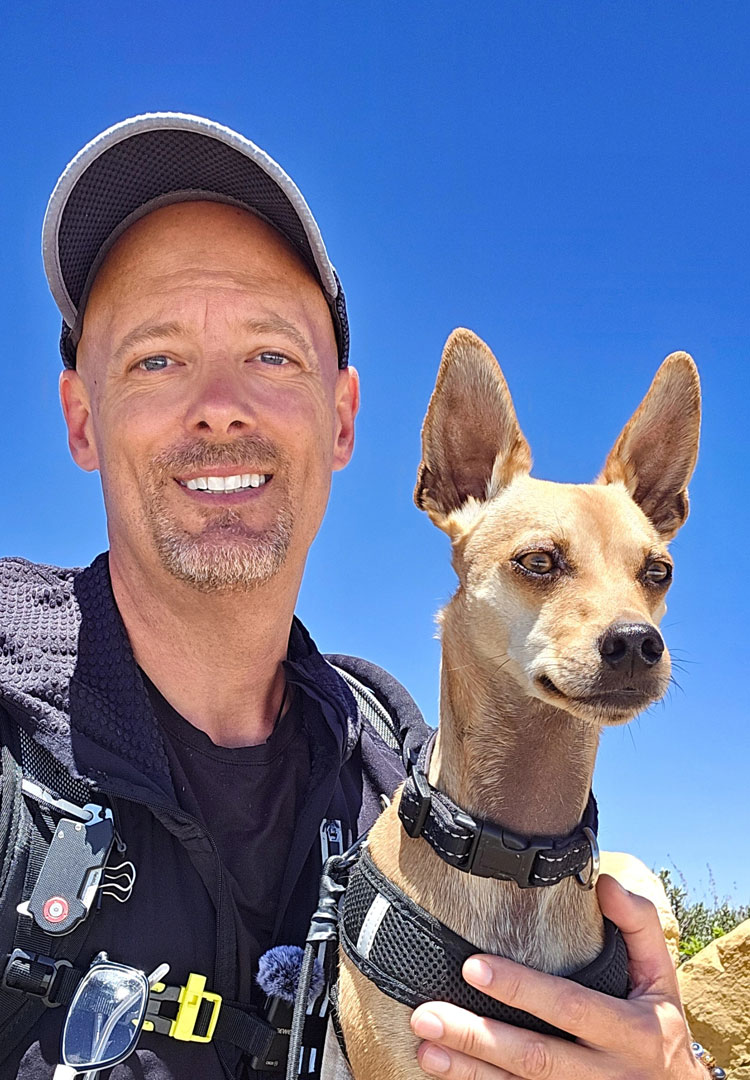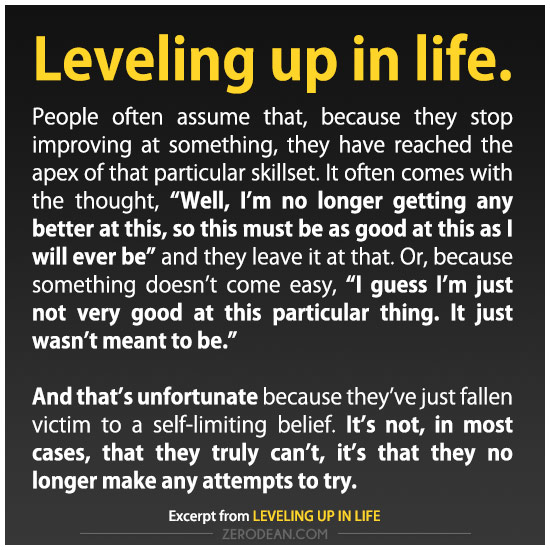It is a fact of life that once we’ve reached a certain level of comfort in nearly any particular skillset, finding the motivation to further improve — or “level up” — one’s abilities in that skillset can be a challenge.
This is because, after a certain point, we reach a plateau and appear to stop getting results. And although we may try for a while, the struggle to further improve upon something is often fraught with failed attempts.
So instead, where we once saw a consistent path of improvement, we fail to get results.
People often assume that, because they stop improving, they have reached the apex of that particular skillset. It often comes with the thought, “Well, I’m no longer getting any better at this, so this must be as good at this as I will ever be” and they leave it at that. Or, because something doesn’t come easy, “I guess I’m just not very good at this particular thing. It just wasn’t meant to be.”
“I will never be a faster typer than this.”
“I will never be able to perform this skateboarding trick.”
“I will never be able to run a 5 minute mile.”
“I will never be able to paint like the pros.”
“I will never be fluent in another language.”
“I will never be able to play the piano well.”
And so on.
And that’s unfortunate because they’ve just fallen victim to a self-limiting belief. It’s not, in most cases, that they truly can’t, it’s that they no longer make any attempts to try.
Others fall into the trap of believing that if they simply continue to use a particular skill that they are comfortable with enough, they’ll get increasingly better at it.
The issue with that is that after you effectively hit a “plateau” with a skill (or a muscle), any further repeating of the same thing you’ve been doing will no longer yield significant gains, changes, or growth.
And that’s because it is the struggling and working hard, not comfortably, at something that causes one to get better at it.
And if you haven’t made the connection as to why this is important, this not only applies to skills, or strength training, but life as well.
“If you want something you’ve never had, then you’ve got to do something you’ve never done.”
It’s also why a wise person once said, “Life begins at the end of your comfort zone.”
If it doesn’t challenge you, it doesn’t change you.
Joshua Foer, in his 99U talk (video) suggests that you need to “step outside your comfort zone and study yourself failing”.
From his talk description:
“When most of us learn a new skill, we work to get just “good enough” and then we go on autopilot. We hit what journalist and bestselling author Joshua Foer calls the “OK Plateau,” where we have gained sufficient skills for our needs and we stop pushing ourselves.
But experts do it differently. Looking at the research on everyone from incredible athletes to memory champions, Foer has extracted four principles that describe how to push through the OK Plateau to achieve true greatness.”
So if you want to “level up” your skills & abilities and be outstanding, you need to get comfortable with being uncomfortable.
You need to get back to challenging yourself and failing. And learning from your failures and pushing forward despite them.
And, above all, don’t give up until you begin to see positive results. Results being positive changes in your perspective, approach, style, or abilities.
“Everyone wants to live on top of the mountain, but all the happiness and growth occurs while you’re climbing it.” — Andy Rooney
When you don’t get results: Try something else.
If you don’t get the results you want: Try something else.
And if you stop getting results: Try something else.
Related:
- “I can’t do that.”
- Offsite: To be outstanding – get comfortable with being uncomfortable.
- Strength from discomfort
- Offsite: Everyone wants to live on top of the mountain
- Offsite: We acquire the strength we have overcome
- Offsite: Strength doesn’t come from what you can do…
- Level of difficulty
- Growth and Discomfort : Getting outside of your comfort zone
- Think of it as getting better, not older…
From the comments:
Carl: Great post! I have felt like I was at a plateau in my artwork for some time, and this thinking may have been part of it. One needs to examine their process with an eye towards learning how to work smarter, because just taking the same approach and expecting to get better can be just reinforcing bad (or less than ideal) habits that are holding back progress.
While “just doing more work” can lead to unexpected/accidental discoveries that lead to progress (as well as being important for maintaining current skill levels), intentionally thinking about why one approach or another may be better, and trying different approaches to find out what might work better (or finding out what approaches are used by those who are better than you) is likely to be more effective. I need to remind myself of this, more.
Zero: I agree. You can improve simply by doing more work — and have those serendipitous moments (happy accidents), but those, too, are often caused by making mistakes — or certainly by trying something new.
But if you want to improve faster, make more mistakes faster. :)
And I agree with working smarter, not harder — but, in the case of plateauing, it is often our lack of wanting to work hard that keeps us from improving. We’re not willing to make extra work for ourselves when we know of a “shortcut”. But we also never learn what hidden gems are on those long hard roads we fear to take.


